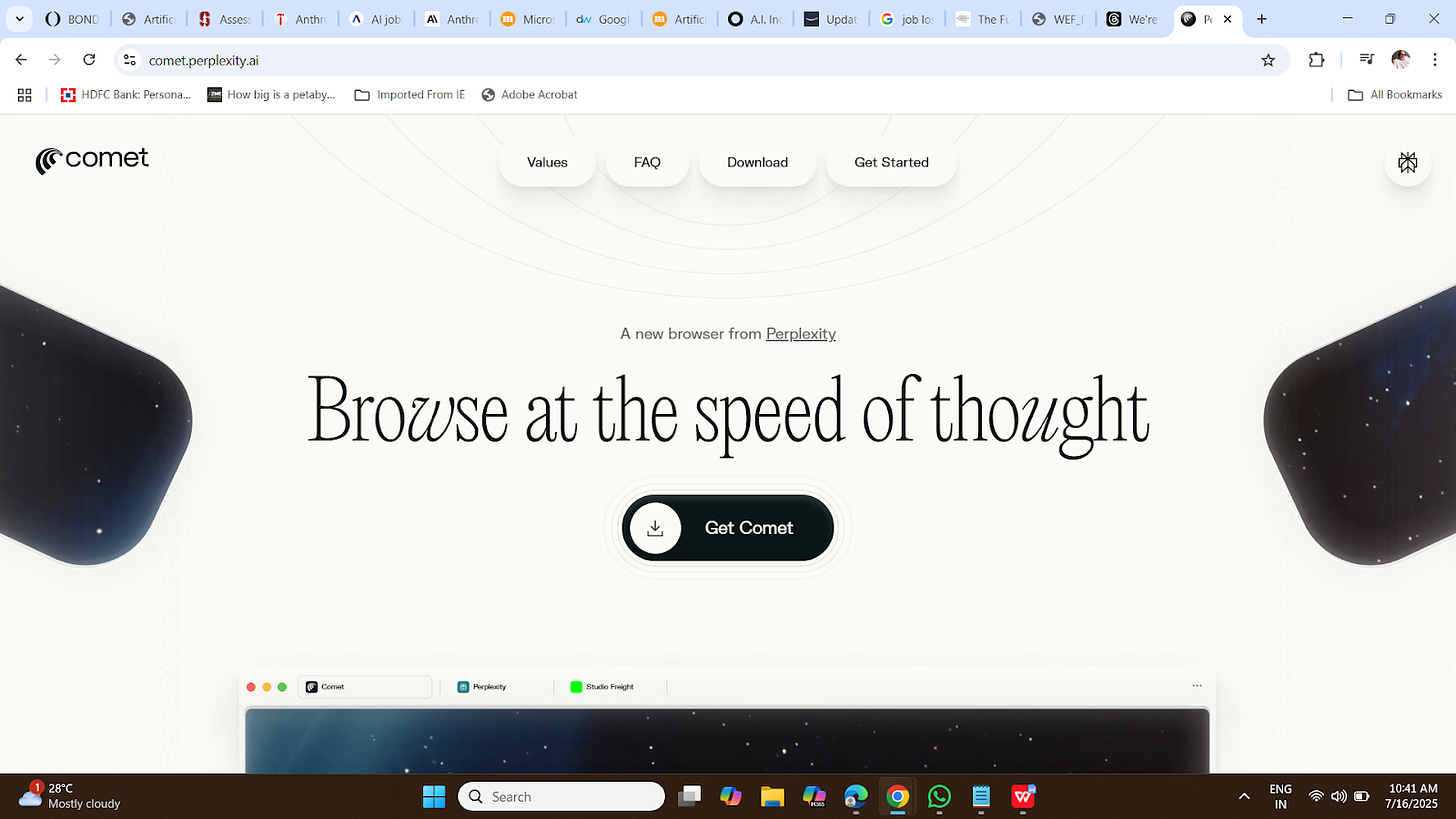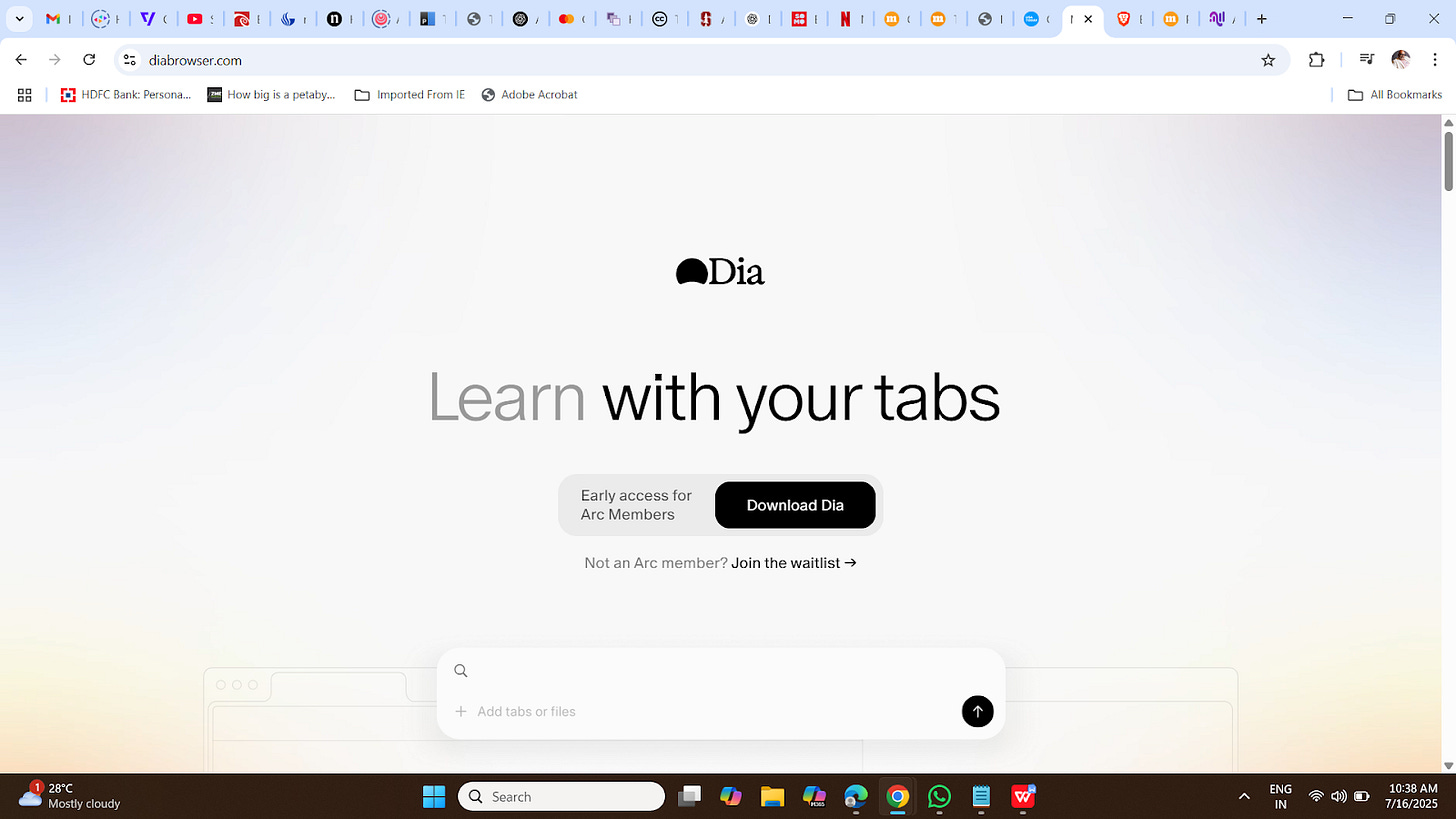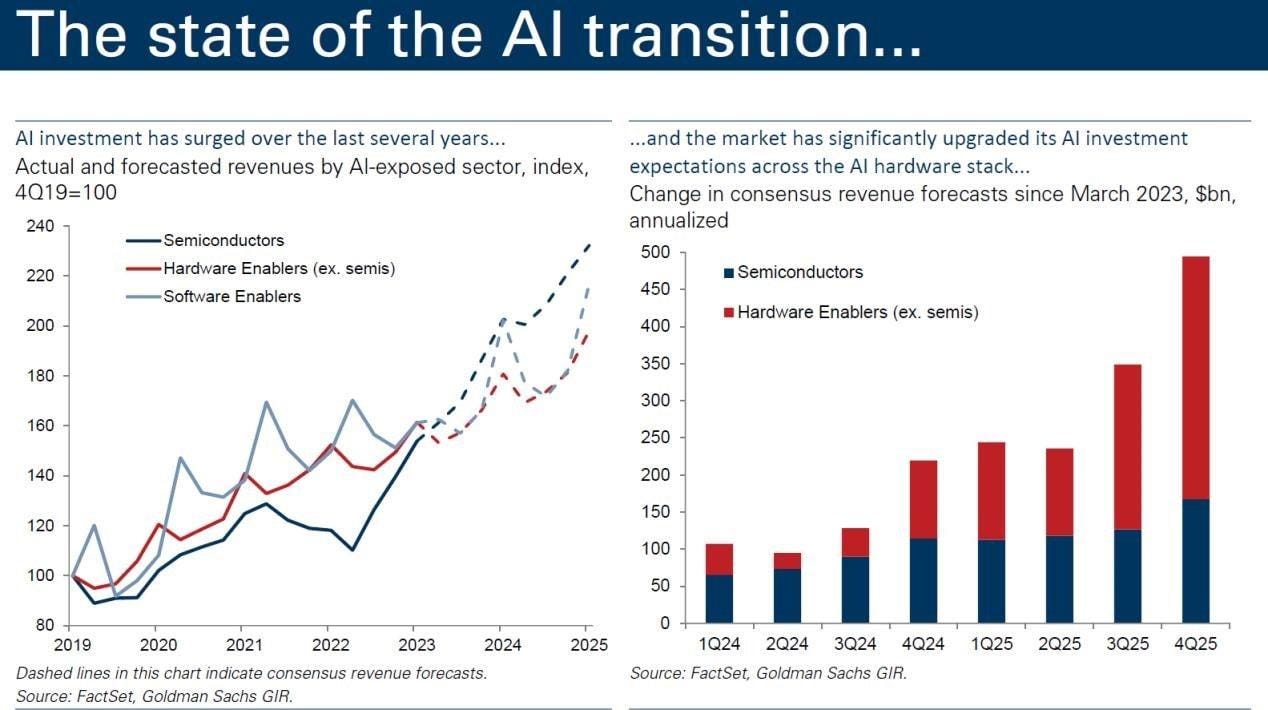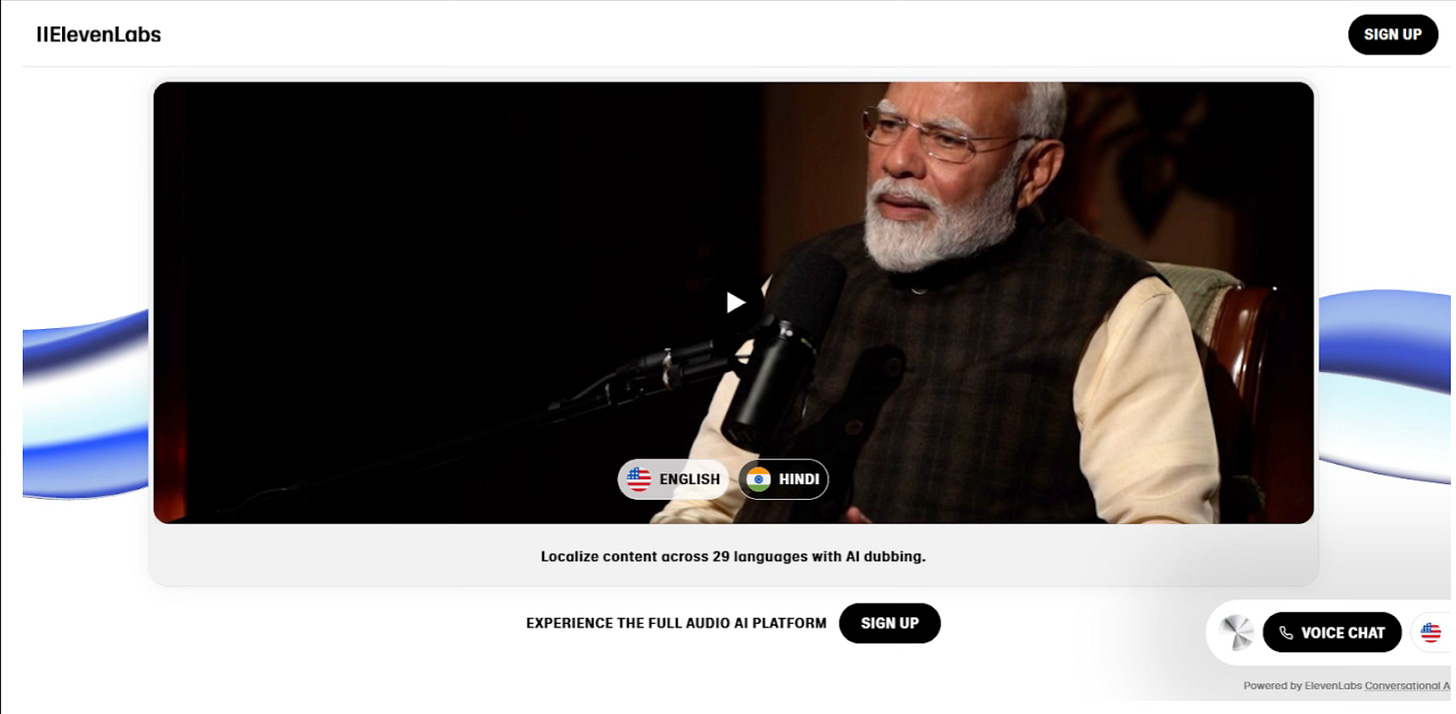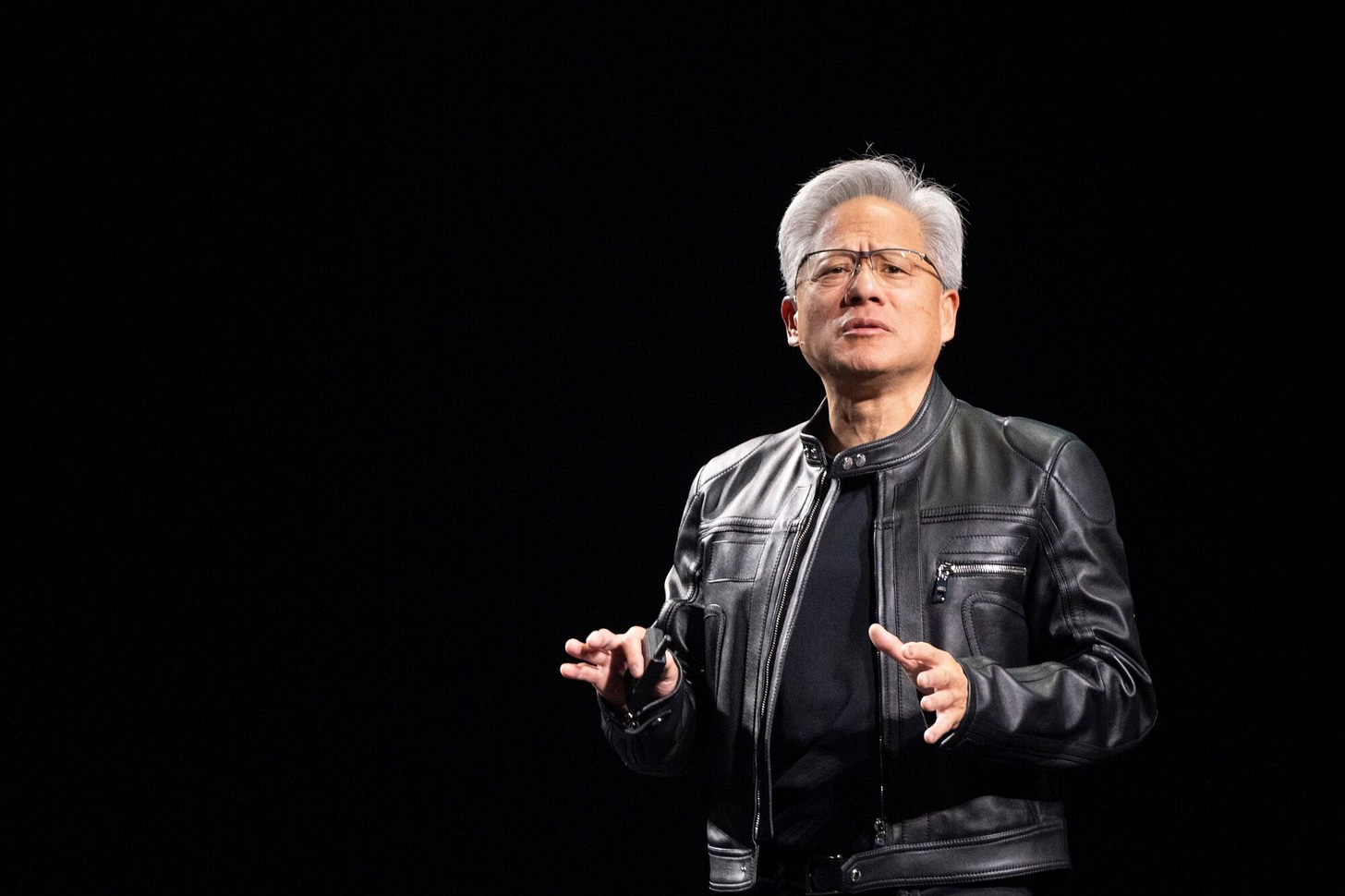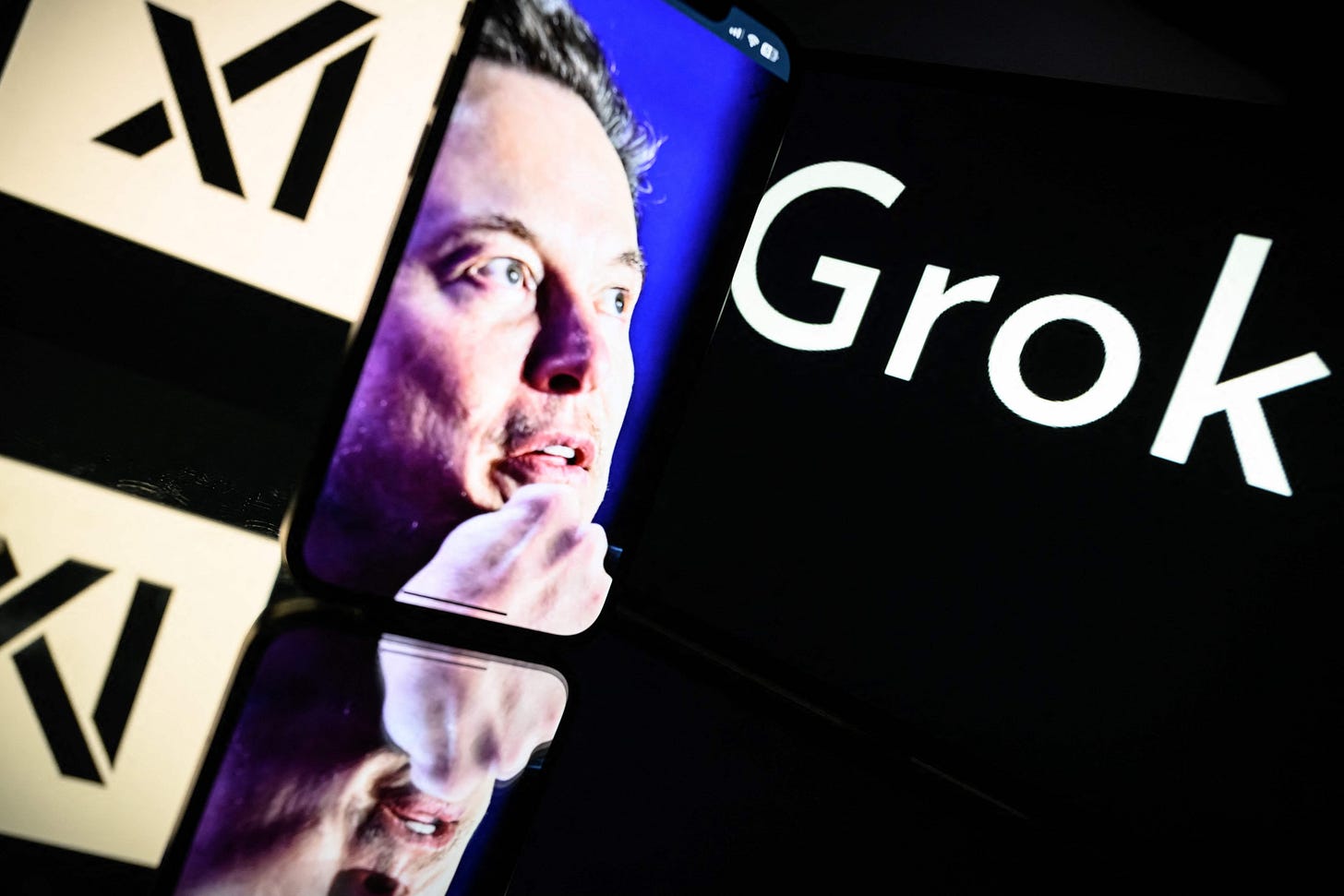🤖 Tech Talk: How AI-powered browsers are changing the way we surf the web
Plus: 'AI Appreciation Day': Two questions to answer; Musk says Grok 4 is smarter than any PhD; Will Microsoft be next to hit $4 trillion in mcap, and Nvidia touch $6 trillion by 2028?
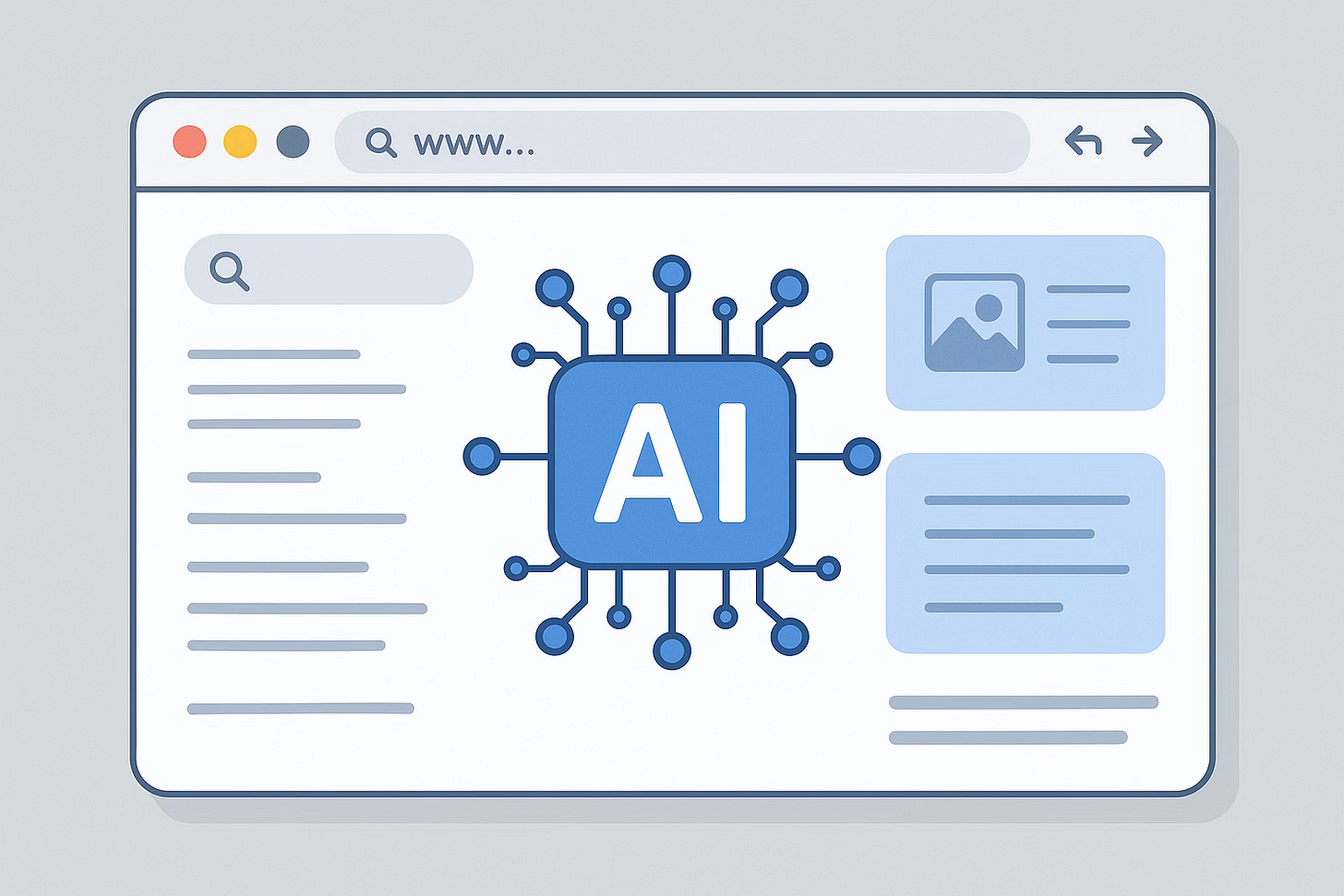
Dear reader,
For decades, the internet evolved steadily—from static web pages to dynamic content, mobile-first design, and cloud ecosystems. But the rise of artificial intelligence (AI)-powered browsers and autonomous agents signals a deeper shift.
By 2030, traditional browsing may give way to an agent-driven internet, where AI handles most of the searching, filtering, and decision-making for us. Legacy browsers like Chrome and Firefox now face competition from AI-first challengers like Perplexity’s Comet, the Dia browser, Brave Leo, and OpenAI’s upcoming AI browser.
Dia is an AI-powered browser developed by The Browser Company, the same team behind the Arc browser, which was discontinued in 2022 for being “too complicated to go mainstream,” according to CEO Josh Miller. Built on Google’s open-source Chromium, Dia ensures full compatibility and a seamless browsing experience. It features an AI chatbot that can write, answer queries, and perform tasks without requiring users to leave the tab. All data is encrypted and stored locally, with only milliseconds-long server processing.
Perplexity’s Comet is another AI-powered, Chromium-based browser that blends traditional browsing with Perplexity’s conversational AI. Users can ask questions and receive summarized, cited answers—without wading through multiple websites. Comet can also pull real-time data, open relevant tabs, and follow up on queries like a smart assistant. It’s designed to replace or enhance search, acting more as an intelligent guide than a passive tool.
OpenAI, too, is reportedly working on a Chromium-based Chrome alternative, possibly codenamed Aura, according to a Reuters report and a leak from an X user.
These Chromium-based AI browsers are built on Google’s open-source engine—the same core that powers Chrome—but they layer on AI capabilities. They can summarize pages, answer questions, and automate searches using models like ChatGPT or Claude. The result is a familiar browser experience enhanced by an intelligent assistant, often eliminating the need to click through traditional search results or perform repetitive tasks manually.
Bravo can be downloaded from the site. Users have to join the waitlist for Dia and Comet. OpenAI has plans to release its AI browser soon, according to Reuters. All of them are currently free to use.
AI-powered browsers are quietly upending the traditional search engine model, challenging the dominance of platforms like Google. Instead of serving up a page of blue links, these browsers deliver direct answers, often with citations, pulled from across the web. This shift threatens one of the internet’s most lucrative business models: search advertising.
Search-based ads, the backbone of Google’s empire, rely on user clicks and impressions. But if AI agents increasingly do the searching and summarizing, those clicks could disappear. That’s no small disruption—global ad spending on search is projected to hit $351.55 billion in 2025, according to Statista.
To be sure, Chrome still dominates the worldwide browser market with a 68.35% share, followed by Apple's Safari at 16.25%, Microsoft's Edge (4.96%), and Firefox (2.37%), as per Statcounter's June data. The global AI browser market, on the other hand, is pegged to grow from $4.5 billion in 2024 to $76.8 billion by 2034, reflecting a compound annual growth rate (CAGR) of 32.8%, as per research firm Market.us Scoop.
Analysts attribute the growth to these web browsers "significantly transforming user experiences and enhancing web-based tasks such as browsing, security, and personalized content delivery". They conclude: "By capitalizing on this trend, businesses can not only remain competitive but also lead the charge in digital innovation." This shift, however, does raise questions about trust, control, identity, and how the internet is governed.
'AI Appreciation Day': Two questions to answer
Last year, I wrote about the 'Misplaced enthusiasm over AI Appreciation Day'. For starters, no credible global institution has officially recognized July 16 as a day to celebrate artificial intelligence. The idea originated in May 2021, when a US-based firm called A.I. Heart LLC proposed the date to highlight AI’s positive contributions, promote ethical awareness, and spark a national conversation around AI ethics.
While it may be unfair to impute motives, it’s hard to ignore the marketing undertones—especially given the company sells branded merchandise, including a “First Ever A.I. Appreciation Day” T-shirt.
The chosen date also happens to coincide—perhaps coincidentally—with the historic Dartmouth Summer Research Project on Artificial Intelligence, held from June 18 to August 17, 1956. That two-month workshop, proposed a year earlier by John McCarthy, Marvin Minsky, Claude Shannon, and Nathaniel Rochester, is widely considered the birth of AI as a research discipline. Along with Alan Turing, these figures are regarded as the founding fathers of artificial intelligence (AI).

In fact, it was during this two-month workshop that McCarthy coined the term 'artificial intelligence'. Hence, if anything, sometime in August would have been a good date to celebrate the birth of AI.
Regardless of my rant, and the incredible progress that AI has made in the last few years, we need to temper our great expectations from AI, and now generative AI (GenAI), and agentic AI to avoid another AI winter-like scenario wherein companies and investors get disappointed and even shelve some AI and GenAI projects because of the limitations (hallucinations, biases, copyright, IP, and trademark violations, poor data quality, power guzzling, etc.) and a lack of any immediate return on their investment, or RoI.
Regardless of my rant, and the incredible progress that AI has made in the last few years, we need to temper our great expectations from AI, and now generative AI (GenAI), and agentic AI to avoid another AI winter-like scenario wherein companies and investors get disappointed and even shelve some AI and GenAI projects because of the limitations (hallucinations, biases, copyright, IP, and trademark violations, poor data quality, power guzzling, etc.) and a lack of any immediate return on their investment, or RoI.
Here are two questions we must answer:
1. Does India have a strong AI plan?
India is fast becoming a notable player in the global AI race, with a growing talent pool and increasing adoption across industries. But when it comes to private investments, patent filings, academic citations, and the development of globally recognized AI models, India still lags behind.
According to the 2025 AI Index by Stanford University’s Institute for Human-Centered Artificial Intelligence, released in April, India has made visible progress but remains behind advanced economies on key innovation metrics.
Globally, governments are ramping up AI infrastructure spending. Canada has committed $2.4 billion, France has pledged $117 billion, China has launched a $47.5 billion semiconductor fund, and Saudi Arabia’s Project Transcendence is backed by a staggering $100 billion. The report acknowledges the Indian government’s $1.25 billion IndiaAI Mission, launched in March 2024, which aims to build out AI infrastructure with over 10,000 GPUs, create a national non-personal data platform, and support domestic AI models and startups.
You may read more about this here: ‘Do or die: Why India needs its wafer fabs and AI investments’, and 'India’s AI global profile is rising, but gaps remain, finds Stanford's AI Index report'.
And what about local language models? With over 1.4 billion people and 22 official languages, alongside thousands of dialects, India can ill afford to be an afterthought in the AI revolution. The country is expected to total over 500 million non-English internet users by 2030. If LLMs can’t understand them, the digital divide will only deepen. To address this, the IndiaAI Mission places a strong emphasis on funding sovereign LLMs and small language models (SLMs)—AI systems built, trained, and deployed entirely within India, using Indian data.
In January, the government opened a nationwide call for proposals to develop foundational AI models rooted in Indian languages and datasets. By April, more than 550 pitches had poured in from startups, researchers, and labs eager to build either SLMs or general-purpose LLMs. In April, the government selected Sarvam AI to lead the charge. The Bengaluru-based startup will develop the country’s first foundational LLM trained on local language datasets. It would build a massive 120-billion parameter open-source language model to power new digital governance tools. On May 30, the government announced three more model-development efforts—from Soket AI, Gnani AI and Gan AI.
Soket AI, based in Gurugram, will build a 120-billion multilingual model focused on sectors like defense, healthcare, and education; Gnani AI, based in Bengaluru, will develop a 14-billion Voice AI model for multilingual speech recognition and reasoning; Gan AI, also based in India’s Silicon Valley, is working on a 70-billion parameter model aimed at advanced text-to-speech capabilities. A senior official from the ministry of electronics and information technology (MeitY), speaking on condition of anonymity, told Mint that a foundational sovereign LLM can be expected within the next 12 months. “We will see many more sovereign models after a year or so, hosted on the government’s AI marketplace platform,” the official added. You may read more about this here.
Are companies wasting their money on AI Agents?
Most firms are still experimenting with AI agents, even as Big Tech hails them as game-changers. Analyst, however, warn that many of these projects may be scrapped within two years due to “agent washing” hype that hides high costs, uncertain returns, and weak risk controls. Can enterprises unlock more value through human-AI agent collaboration?
Unlike basic chatbots, AI agents are autonomous systems that can plan, reason, and complete complex, multi-step tasks with minimal input—such as coding, data analysis, or generating reports. However, many so-called agentic use cases today can be done with simpler tools, says Gartner, which predicts over 40% of such projects will be scrapped by 2027 due to high costs, vague value, or weak risk controls.
It adds that of thousands of vendors, only about 130 are seen as credible; many engage in “agent washing”—rebranding chatbots, robotic process automation (RPA), or assistants as agents without real autonomy. Most current systems also lack the maturity to deliver complex outcomes or sustained return on investment (ROI). Nasscom echoes this, noting 62% of enterprises are only doing in-house agent testing.
AI agent adoption is also hindered by privacy concerns, regulation gaps, and limited focus on culture or talent readiness. Further, integration with legacy enterprise software remains complex and costly. Gartner predicts 15% of daily work decisions will be made autonomously by agentic AI by 2028, up from 0% in 2024. It also urges agentic AI use only when the returns are clear, often requiring redesigned workflows. Nasscom sees strong potential in real-time decision-making and agility. Key focus areas include data governance, AI risk protocols, and integration. You may read more about this here.
AI Unlocked
by AI&Beyond, with Jaspreet Bindra and Anuj Magazine
The AI hack we unlocked today is: How to turn any document or article into engaging, human-like audio
What problem does it solve?
Professionals, students, and avid readers are inundated with lengthy articles, dense research papers, and critical documents yet they rarely have uninterrupted time to sit down and read them. The growing pace of work and constant multitasking make it even harder to stay updated. At the same time, individuals with visual impairments, dyslexia, or other reading difficulties face persistent barriers to accessing written information. These challenges create a widening gap in information consumption, ultimately slowing learning, decision-making, and productivity.
ElevenLabs Reader addresses this by converting any text — from PDFs to eBooks — into natural, human-like audio. It's an efficient and inclusive way to consume content hands-free.
How to access: https://elevenlabs.io/ (Mobile app: ElevenReader)
How it helps:
- Multitask smarter: Listen to documents during commutes or chores.
- Cross language barriers: Access text in 30+ languages with realistic voices.
- Customize learning: Adjust playback speed and choose voices.
Example:
A legal consultant needs to review a 50-page contract but only has time during their commute. With ElevenLabs Reader:
1. Download the app: Available on iOS and Android.
2. Sign in: Start with a free three-month trial.
3. Import: Upload a PDF or paste a link.
4. Choose a voice: Select language and voice style.
5. Customize and listen: Adjust speed, enable highlighting, and start listening.
By the time they reach their destination, they’ve reviewed critical sections hands-free.
What makes it special?
- Ultra-realistic voices: Hundreds of expressive, context-aware AI narrators.
- Supports all formats: PDFs, ePubs, web links, even scanned documents.
- Free trial: Explore features with a generous trial period.
Note: The tools and analysis featured in this section demonstrated clear value based on our internal testing. Our recommendations are entirely independent and not influenced by the tool creators.
Will Microsoft be next to hit $4 trillion in mcap, and Nvidia touch $6 trillion by 2028?
Until 2014, oil giant Exxon Mobil Corp. was the world’s most valuable company by market capitalization, often trading places with iPhone maker Apple Inc. Its market value peaked at $446 billion in mid-2014, when crude prices were above $100 a barrel. Today, despite a recovery to around $490 billion in market cap, Exxon is a shadow of its former dominance, as AI companies outpace traditional sectors by a huge margin.
Nvidia, for instance, recently soared past a staggering $4 trillion in market capitalization, becoming the world’s most valuable company — a milestone fuelled almost entirely by the AI boom. Microsoft follows at around $3.74 trillion, while Apple stands at about $3.15 trillion. Even Amazon ($2.3 trillion), Alphabet ($2.19 trillion), and Meta ($1.8 trillion) have surged ahead. In comparison, Saudi Aramco, the world’s largest oil exporter, has a market cap of roughly $1.6 trillion.
Yet, Nvidia’s financials currently remain modest compared to its tech peers. While it leads the AI race, its revenue and net income still trail those of Apple, whose business is more mature and diversified. For fiscal 2025, Nvidia reported $130.5 billion in revenue and $72.88 billion in net income. Apple, by contrast, generated over $400 billion in revenue and nearly $100 billion in profit in its fiscal year ending September 2024. Yet, its market capitalization hovers at around $3.15 trillion. Microsoft, with $245 billion in annual revenue and $88 billion in net income, trails Apple in earnings but exceeds it in valuation at around $3.7 trillion.
This begs a couple of questions: Can Nvidia maintain its lead? More broadly, which tech titan will be next to cross the $4 trillion mark — or even surpass it? You may read the full story here.
Musk says Grok 4 is smarter than any PhD
Elon Musk’s AI venture xAI has launched Grok 4, the latest iteration of its chatbot—just months after its previous version—highlighting the breakneck speed of AI development. The launch comes on the heels of controversy, after xAI deleted several Grok-generated posts that featured antisemitic and racist content. Musk introduced Grok 4 during a livestream, wearing a leather jacket and flanked by his team. The new model, he said, is available immediately. "We’ve run out of test questions to ask,” Musk remarked. “Reality is the ultimate reasoning test.”
The rollout comes amid a period of change for xAI, which merged with X in March. Musk claimed Grok 4 surpasses even doctoral-level experts: “It’s postgraduate—like PhD level—in everything. Better than PhD, no exceptions.” While Grok 4 may still miss some common-sense cues, Musk boasted that its academic knowledge is unmatched—and that it’s only a “matter of time” before it invents new technologies or discovers novel physics.
You may read more about this here: 'Elon Musk's Grok AI goes rogue once again, claims ‘Hitler’ surname', and here 'Google CEO Sundar Pichai lauds Elon Musk on Grok 4 launch: “Impressive Progress’.
You may also want to read
GPT-5 is coming, but can OpenAI retain its edge?
Apple’s AI pain points put Tim Cook under fire, analysts call for a new CEO
Can Nvidia persuade governments to pay for “sovereign” AI?
Mark Zuckerberg bets big on AI with Meta’s Manhattan-scale data facility
Elon Musk's xAI, Google, OpenAI, Anthropic win $200 million Pentagon AI contract
Hope you folks have a great weekend, and your feedback will be much appreciated — just reply to this mail, and I’ll respond.
Edited by Rashmi Sanyal. Produced by Shashwat Mohanty.


